|
|
|
Sort Order |
|
|
|
Items / Page
|
|
|
|
|
|
|
| Srl | Item |
| 1 |
ID:
091228
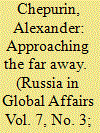

|
|
|
| 2 |
ID:
146260
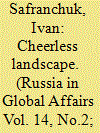

|
|
|
|
|
| Summary/Abstract |
U.S. presidential elections are invariably accompanied by talk about the possibility of turning a new page on some essential political issue or even policy course. In fact, a new administration and policy line is more than guaranteed if the incumbent is not in the presidential race. Today U.S.-Russia relations have plummeted to a low not seen since the end of the Cold War or possibly even earlier. Yet chances for better relations between the two countries when the 45th U.S. president takes office are slim. Indeed, they will remain so at least as long as the current unfavorable situation continues.
|
|
|
|
|
|
|
|
|
|
|
|
|
|
|
|
| 3 |
ID:
100339
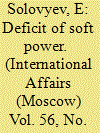

|
|
|
|
|
| Publication |
2010.
|
| Summary/Abstract |
ENERGY REMAINS one of the most important factors in the present-day world. Oil, gas, power engineering and the nuclear power industry constitute the core of Russia's modern economy, making it a serious player on the international arena, a true energy superpower. Oil, oil products and natural gas account for two-thirds of Russian exports. The oil and gas sector largely predetermines Russia's geopolitical positions and its role in ensuring the energy security of the globalizing world. Not surprisingly, the energy factor is regarded as one of the most important means of invigorating our cooperation with the CIS countries and even as an instrument of projecting Russia's power to different countries in the post-Soviet space.1 At the same time the energy sphere is a field of serious conflicts in the modern world. Suffice it to mention the wish of China, the U.S., and some EU countries to secure direct access to the oil and gas resources of Central Asia. Maintenance of its stature as an energy power and the expansion of its capabilities in the energy sphere are in fact closely linked to Russia's ability to strengthen its positions in the neighboring states, primarily in the Caucasus and Central Asia. However, achieving this only through traditional diplomatic methods of the past one and a half to two decades is a complex, almost unfeasible task.
|
|
|
|
|
|
|
|
|
|
|
|
|
|
|
|
| 4 |
ID:
138789
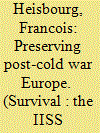

|
|
|
|
|
| Summary/Abstract |
During the two decades preceding the Russian annexation of Crimea, Western powers did not have a comprehensive strategy towards Russia because they perceived no need to devise one. The West did have a full-spectrum strategy for inclusion of the former members of the Warsaw Pact and the Baltic States into NATO and the European Union, to create a trategically and societally unified space in a ‘Europe whole and free’.
|
|
|
|
|
|
|
|
|
|
|
|
|
|
|
|
| 5 |
ID:
107955
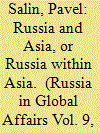

|
|
|
| 6 |
ID:
123980
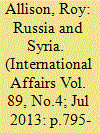

|
|
|
|
|
| Publication |
2013.
|
| Summary/Abstract |
This article explores explanations of Russia's unyielding alignment with the Syrian regime of Bashar al-Assad since the Syrian crisis erupted in the spring of 2011.
Russia has provided a diplomatic shield for Damascus in the UN Security Council and has continued to supply it with modern arms. Putin's resistance to any scenario of western-led intervention in Syria, on the model of the Libya campaign, in itself does not explain Russian policy. For this we need to analyse underlying Russian motives. The article argues that identity or solidarity between the Soviet Union/Russia and Syria has exerted little real influence, besides leaving some strategic nostalgia among Russian security policy-makers. Russian material interests in Syria are also overstated, although Russia still hopes to entrench itself in the regional politics of the Middle East.
Of more significance is the potential impact of the Syria crisis on the domestic political order of the Russian state. First, the nexus between regional spillover from Syria, Islamist networks and insurgency in the North Caucasus is a cause of concern-although the risk of 'blowback' to Russia is exaggerated. Second, Moscow rejects calls for the departure of Assad as another case of the western community imposing standards of political legitimacy on a 'sovereign state' to enforce regime change, with future implications for Russia or other authoritarian members of the Commonwealth of Independent States.
Russia may try to enshrine its influence in the Middle East through a peace process for Syria, but if Syria descends further into chaos western states may be able to achieve no more in practice than emergency coordination with Russia.
|
|
|
|
|
|
|
|
|
|
|
|
|
|
|
|
| 7 |
ID:
128840
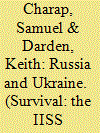

|
|
|
|
|
| Publication |
2014.
|
| Summary/Abstract |
The West has often assumed that Russia is inherently hostile to Ukraine, and the Marchevents seem to validate that assumption. But Moscow's moves are in fact a realdeparture from previous Russian policy.
In his book The Clash of Civilizations and the Remaking of World Order, Samuel Huntington makes the case for the utility of an external enemy in maintaining a coherent US national identity. 'For self-definition and motivation, people need enemies', he wrote.1 His thesis has been widely discredited. But recent developments in Ukraine seem to have partially validated the claim, and given it a new dimension. After 25 years of the West treating Russia as an enemy in Ukraine, Moscow might have really become one. Even prior to recent events, the depiction of Russian policy in Ukraine as nefarious has always, of course, held a kernel of truth. Russia's actions there since the Soviet collapse have been far from constructive and transparent. And the rhetoric of senior officials - in a particular notorious example, Vladimir Putin himself questioned whether Ukraine was a real country in a private moment with George W. Bush - has at times been inflammatory, subversive or incendiary.
But until the collapse of the EU-brokered political settlement on 21 February, Russia's actions in Ukraine had never merited the labels usually ascribed to them: expansionist, neo-imperial, neo-Soviet, aggressive, and so on. Indeed, until that watershed moment, it would have been wrong to attribute any significant development in Ukraine's recent political crisis to Russia. Yes, in the autumn of 2013 Russia did use economic levers to demonstrate to President Victor Yanukovich the costs of proceeding with the proposed Association Agreement with the EU. But it was Yanukovich, at the end of the day, and not Putin, who decided to make the shift - and it is unlikely that the Ukrainian president was serious about implementing the agreement in the first place. Even so, Russia's levers in Ukraine are entirely of the Ukrainians' making. If Yanukovich or any of his predecessors had spent less time getting rich off the gas trade with Russia, and more time implementing a comprehensive energy-efficiency policy (Ukraine has one of the world's highest rates of energy consumption per unit of GDP), creating a domestic gas market and forging an investment climate conducive to the development of Ukraine's own gas reserves, Moscow would not have had any significant economic leverage. The effectiveness of economic coercion in this case is no credit to Russia's strength; rather, it is a reflection of the utter failure of the Ukrainian elite to reform the country's economy.
|
|
|
|
|
|
|
|
|
|
|
|
|
|
|
|
| 8 |
ID:
118426
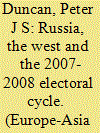

|
|
|
|
|
| Publication |
2013.
|
| Summary/Abstract |
In the period before the 2007-2008 elections, there was much talk from the regime about the danger of a 'coloured revolution' in Russia. The article considers whether the fear of revolution was genuine or artificially created to discredit opposition and strengthen support for the regime. It seems that tensions inside the regime and the unexpected occurrence of the previous coloured revolutions led to real fears of revolution in Russia, although this was in fact unlikely. Russian policy towards the West and the rival election programmes are examined to investigate whether the regime was creating an 'enemy image' of the West.
|
|
|
|
|
|
|
|
|
|
|
|
|
|
|
|
| 9 |
ID:
090499
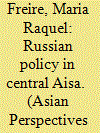

|
|
|
| 10 |
ID:
121015
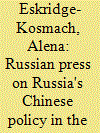

|
|
|
|
|
| Publication |
2012.
|
| Summary/Abstract |
The article is devoted to the changes in the analysis in contemporary Russian press of the approaches towards Russian policy in the Far East in connection with the events of the Chinese-Japanese War in the mid-1890s, when the focus of the international contradictions shifted to the Far East. All of these real and presumed events began to attract more attention from Russian society and the Russian press. The fact of the Chinese defeat in the war against Japan made the Russian press of all political persuasions reconsider and reform their points of view with respect to China and the Far East in general.
|
|
|
|
|
|
|
|
|
|
|
|
|
|
|
|
| 11 |
ID:
116309
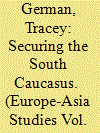

|
|
|
|
|
| Publication |
2012.
|
| Summary/Abstract |
In the wake of the 2008 conflict with Georgia, Russia has re-established itself as the dominant actor in the South Caucasus, consolidating its military presence in the region and reinforcing its already substantial diplomatic and economic levers. This essay examines recent Russian policy towards the region as Moscow attempts to counterbalance growing Western involvement within what it perceives to be its zone of 'privileged interest', focusing on military aspects of its policy towards Abkhazia and South Ossetia, and the implications for security across the South Caucasus.
|
|
|
|
|
|
|
|
|
|
|
|
|
|
|
|
| 12 |
ID:
100938
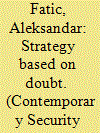

|
|
|
|
|
| Publication |
2010.
|
| Summary/Abstract |
Russia's role in the Balkans waned in the post-Cold War period until President Dmitry Medvedev's Serbia visit in October 2009. The visit marked a sharp turn in Russia's approach to the region, with the new and more assertive rhetoric suggesting Russia's willingness to engage in 'infighting' the western military and energy security interests. Revived Russian interest in a new security mechanism for Europe to replace NATO, talk of establishing a Russian base in the Serbian town of Nis,and the likelihood that the entire length of the Southern Stream gas pipeline through Serbia will be guarded by the Russian Army, show that Russia is serious about countering NATO in the Balkans.
The article examines the strategic reasons for the shift in Russian policy, specifically with a focus on why it is in Russia's vital interest to prevent a future expansion of NATO. The author briefly explores the consequences of the renewed Russian strategic interest for the region on the processes of policy- and identity-formation in Southeastern Europe. He relates the specific strategic concerns that led to Russian proposal for a new security mechanism for Europe to collectively identity problems of the Balkans. Russia's attempted strategic marriage, it is argued here, with Serbia is based on of convenience. Russia's opposition to further NATO expansion is grounded in rational security concerns; yet the sparseness of Russia's genuine strategic partners in Europe makes efforts to dissipate escalation of animosities between Russia and NATO less effective. Hence the paradox: the less successful Russia is in galvanizing opposition among the small countries in Europe against further NATO enlargement, the more likely it is that its new security policy will escalate to more drastic and antagonistic postures towards NATO.
|
|
|
|
|
|
|
|
|
|
|
|
|
|
|
|
| 13 |
ID:
171697
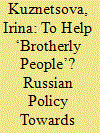

|
|
|
|
|
| Summary/Abstract |
The essay focuses on Russian policy towards displaced persons from Ukraine’s war-torn territories from 2014 until mid-2019. The privileging of refugees from Ukraine relative to immigrants and refugees from other countries and, later, the granting of Russian citizenship to Ukrainian citizens from the Donetsk and Luhansk regions, were interwoven with both influence-seeking in the Russian geopolitical neighbourhood and transborder nationalism and supported via direct presidential control of immigration. Despite a series of decrees and involvement of civil society in providing support, this essay detected a lack of efficient mechanisms for responding to the needs of the displaced.
|
|
|
|
|
|
|
|
|
|
|
|
|
|
|
|
|
|
|
|
|